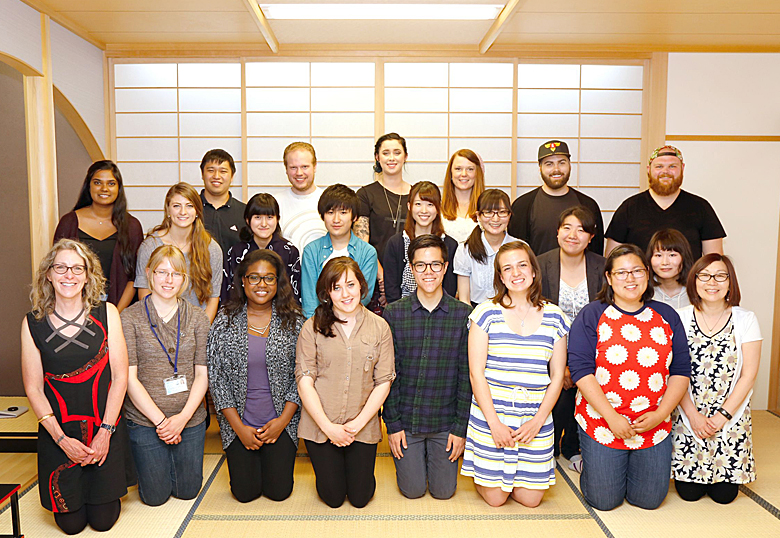Student tour gives students direct cultural experience
 Participating in a course like the Study Tour of Japan gives students an education that goes beyond learning in a university classroom and the typical tourist experience. Students gain firsthand knowledge of life in Japan from those who live there.
Participating in a course like the Study Tour of Japan gives students an education that goes beyond learning in a university classroom and the typical tourist experience. Students gain firsthand knowledge of life in Japan from those who live there.
“The purpose of the trip is to provide students with an initial exposure to Japanese culture and society,” says Dr. Catherine Kingfisher, a University of Lethbridge anthropology professor, who, along with Diane Minamide, co-ordinator of International Programs and Exchanges, took 14 students to Japan for almost four weeks of intense learning this past summer. “For me as an anthropologist, I couldn’t think of a better way to teach a course than on-site.”
Before they left, the students received training in the Japanese language and did preliminary research on Japanese culture and society. The U of L has a longstanding exchange agreement for both students and faculty with Hokkai-Gakuen University in Sapporo. Every two years, the U of L sends a group of students for a summer cultural program. Students stay with Japanese host families during their time at Hokkai-Gakuen.
Myles Shirakawa, a third-year U of L student studying French, went on the study tour because of his interest in the culture and language and his familial roots in Japan. His great grandparents left Japan for Canada in the early 1900s. As a southern Albertan used to wide, open spaces, Tokyo’s dense population came as a shock.
“For example, when you take the subways or trains, especially during rush hour, you have to get used to a different dynamic,” he says. “This dynamic also reflects in the culture and the language where you have to be more cognizant of the relationship between yourself and others.”
Dana Grinde, a third-year U of L student majoring in anthropology and psychology, took the course as a way to gain international experience without the time commitment of a whole semester abroad.
“The highlight of my trip was getting to know a group of U of L students in a different context. Travelling with the group was the best part for sure,” says Grinde. “We worked together really well and it was just a lot of fun travelling with them.”
The group spent its first four nights in Tokyo. They visited a number of sites, including an urban collective housing community where Kingfisher is conducting research.
“I’m interested in looking at models of well-being that aren’t based on individualism and personal satisfaction,” says Kingfisher. “Diane (Minamide) was absolutely essential to this trip. Her Japanese is very good and she could translate and interpret when it was necessary. She was pivotal, and the students just loved her.”
After Tokyo, the students made their way to Sapporo where they lived with host families and attended classes at Hokkai-Gakuen University for two-and-a-half weeks. Shirakawa says everyone was kind and went out of their way to make him feel welcome.
“I had read and studied about Japan but I had never been before so it was interesting to see how they live firsthand,” he says.
“I had all these pictures in my head about what Japan would be like. Then you go there and you realize it’s not at all what you picture,” says Grinde.
After leaving Sapporo, the group visited Kyoto before returning home to Canada. One of the students’ favourite activities was going to an onsen or hot springs. Each gender has its own pools and people must bathe thoroughly before entering the pools.
“It’s a different kind of experience. You have to go in nude and, sure, it can feel a little awkward at times but at the same time it’s rather quite soothing,” says Shirakawa.
“There’s a Japanese word for naked relationship. That was new for all of us,” says Grinde. “The idea is that when you’re in the onsen with other people, you’re all equals.”
“The whole experience was amazing,” says Shirakawa. “If any other students are considering taking part in the Japan study tour, do try and fit it in. It is a bit of an expense but it’s wonderful to go and experience the culture.”
The students received help with funding from the Campus Alberta Grant for International Learning (CAGFIL).
“They were the most dedicated, fabulous bunch of students I’ve ever worked with. They participated in everything; nobody ever missed a class or event,” says Kingfisher. “They worked really hard and had to give speeches in Japanese at different events. Every single one of these students came up to me at some point and said ‘my host family is the best host family.’”
A number of the students have maintained their interest in Japan and plan to return to teach English or for further study.
